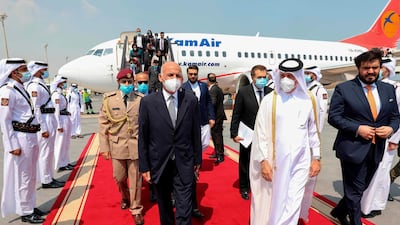Taliban and Afghan government-backed negotiators have agreed on a broad code of conduct to advance the intra-Afghan peace talks, even as key differences between the two warring sides remain, Reuters cited three official sources as saying.
Efforts to resolve disagreements over Islamic jurisprudence and whether a US-Taliban accord reached in February on a US troop withdrawal would serve as the basis of the peace talks will continue on the sidelines of the main negotiations in Qatar, two sources told the agency.
The progress was achieved with the help of US officials, as the two sides drew up 19 ground rules that their negotiators should observe during talks, the sources said.
"Firming up code of conduct was extremely crucial as it proves that both sides are willing to continue talks even as we see that violence has not reduced on the ground," said a senior western diplomat.
The Afghan government’s official negotiating team denied there was a formal agreement but did not deny that ground rules had been hashed out.
Nader Nadery, a senior government negotiator, said there were still issues to be ironed out.
"The discussion over the rules and procedures is not yet completed and there are issues that need to be further finalised and therefore more work needs to be done," said Mr Nadery.
The latest progress came during a visit to Doha on Monday by Afghan President Ashraf Ghani.
The president held talks with Qatari leaders as well as US Special Envoy Zalmay Khalilzad and the commander of US and Nato troops in Afghanistan, Gen Austin Miller.
The intra-Afghan talks follow-up on a landmark deal signed between the United States and the Taliban in February.
Under the deal, foreign forces will leave Afghanistan by May 2021 in exchange for counter-terrorism guarantees from the Taliban, which agreed to negotiate a permanent ceasefire and a power-sharing formula with the Afghan government.
Diplomats have said talks got off to a difficult start, with disagreements over how the Hanafi Islamic code could be used to guide negotiations and on whether the deal signed between the United States and the Taliban in February should be the basis for the talks, as demanded by the Taliban.
The three sources said the delegations were putting those differences aside to move forward and agree on an agenda, but would work on resolving these issues during negotiations.
"The ground rules will serve as a foundation as both sides are making an effort to prevent a collapse," said a second senior official in Doha overseeing the talks.
A ceasefire is a top priority for the Afghan officials and the western diplomats who are facilitating these talks.
While the talks have been taking place, scores of Afghan soldiers and Taliban fighters have been killed in clashes. Dozens of civilians have also died in recent weeks.
Some analysts say the Taliban is unlikely to agree to a comprehensive ceasefire yet, since violence and clashes with Afghan forces give insurgents leverage at the negotiation table.






























